There Are No Prizes for Good Little Girls
If I Were a Man, I'd Be the Man
If I were 11 years old in 2025, I would probably be non-binary.
You may not realize it looking at me, but I genuinely feel like a failed woman sometimes, internally if not externally1. And, when I was younger, I felt like a failed girl, and I feel like if I had the contemporary vocabulary to articulate this feeling of abject alienation from my gender when I was a kid, I’d probably have came to the conclusion I was non-binary. But that said, I was never, and will never be, anything but female, no matter how traumatizing it was for me at times, and how I’d have given anything to opt out of it when I was younger, and sometimes even to this day.2
Part of the sentiment of being a “failed girl” stemmed from the corporeal: I was an early developer™ and wanted OUT of my body since I didn’t understand why I wasn’t flat-chested like other girls my age3. I desperately wanted to opt out of puberty and growing into a woman so to speak, and I would have taken any silver bullet to delay or bypass it, risks be damned. I would wear a sweatshirt in the southern California sunshine so nobody could see the outline of my chest, and so nobody could snap my bra strap (yes that actually happened in the 5th grade). I eventually grew past the worst of that brand of self-loathing, but the physical was only a part of my alienation from my gender.
When I was a kid, I wasn’t very popular with my peers, especially with other girls. I was always too sharp and incisive, ambitious and cerebral, and I also just didn’t understand the way social structures worked, who played with who and whatnot. For a while, I’d hang out with the boys because they were more inclined to overlook my awkwardness, but by late elementary school, kids start sex-segregating and other girls honed in on my oddities, and made it clear to me that I was “not like them.” So, during recess, I’d read a book on the bench and when I was done, walk the perimeter of the playground while balancing the book on my head.
In the 20 years since the 5th grade, I’d like to think I’ve mellowed out, and meticulously sanded down the sharpest of my edges, the ones that scratched me and those around me. I learned to make and retain female friends, but like everything else it took intentional effort and a lot of trial and error. But, even as an adult woman who’s married and loved by her family and friends and husband, I sometimes feel like I’m doing womanhood all wrong. I logically know that there are a lot of women who are my kindred spirits (my mother, my friends, my celebrity blorbo, Taylor Swift), but when I see how people talk about women online, both men and women alike, I just feel so alienated from womanhood at large.
Last week, Helen Andrews published a piece called “The Great Feminization,” and it was praised and criticized and outright derided depending on who you asked. I read the piece when it was posted but I wanted to collect my thoughts before writing it on it.
In the essay, Andrews argues that since the Great Awokening (or even before), the locus of power in Western institutions has shifted. As women started outperforming men academically and professionally, they become the numerical majority in key professions and institutional roles, and Andrews insists that the character of those institutions is fundamentally changed. Andrews writes, “Feminization is not an organic result of women outcompeting men. It is an artificial result of social engineering, and if we take our thumb off the scale it will collapse within a generation.” In other words, she’s disdainful and actively disgusted by this so-called “feminization.”
The thing is, Andrews seems ignorant of the fact that the phenomenon she’s criticizing is responsible for her own power and influence. It’s akin to the right-wing women that rage against feminism, like who do you think gave you the right to vote for Republicans and yap constantly online instead of being barefoot and pregnant from ages 18 to 45 with no respite? Hint: It wasn’t social conservatives!
Regarding Andrews, in The Bulwark, Cathy Young writes:
It’s not that women are bad, says Andrews; but their distinct qualities and values—“empathy over rationality, safety over risk, cohesion over competition”—transform these institutions in ruinous ways. Let too many women flock to academia, and we get touchy-feely stuff instead of “open debate and the unfettered pursuit of truth.” Too many women in journalism spell the decline of “prickly individualists” willing to brave public disapproval. (Other, that is, than Andrews herself, who is careful to inform the reader that she’s not like other girls: she has “a lot of disagreeable opinions” and is not down with a “conflict-averse and consensus-driven” culture.) Business? Goodbye, “swashbuckling spirit”; hello, “feminized, inward-focused bureaucracy.”
However, even if Andrews has a directionally correct point about ideological institutional capture in the last 15 years and there are valid critiques to be made about affirmative action and identity politics in academia and the professional world, she doesn’t actually offer any actionable solutions for the problem she diagnoses. She suggests that we collectively should “take our thumb off the scale” and roll back anti-discrimination laws that supposedly make it “illegal to employ too few women.” I’m cool with that, so now what?
Even if Andrews herself doesn’t articulate any real fixes for the feminization problem, her allies on the right do, and those fixes aren’t palatable to me or quite frankly, Andrews herself since she’s a famous author with an extensive bibliography, and clearly doesn’t want to give up the money and status it brings.
Something else that I noticed is that a lot of people are pushing back on Andrews’ argument by (and I’m paraphrasing) saying that women have different strengths, and may not be naturally risk-tolerant but bring other things to the table professionally. On her Substack, which David French referenced in the New York Times, Kelly Chapman writes,
It’s all the same story: once softness becomes moralized as decline, emotional austerity can be the only vehicle for truth. Years in, thanks to the Take Economy, truth can only be truth when it’s dressed in the harshest language possible. Harshness is the only thing that cuts through the fog, the only way to prove you aren’t like the others, the only way to show you know what’s what. For a truth to pierce in the anti-woke sphere, it must pierce indeed. It must cut right to the heart and wound and slice up all that soft flesh, and if you die, all the better. Survival of the fittest. The endpoint is cruelty, just as it was for performative empathy. Power is the only truth. Sincerity is suspect. Redemption4 exists in neither world.
Look, I believe that cruelty is wrong (love all, trust a few, do wrong to none etc.) but it’s blatantly obvious that both Chapman and French approach the world from an inherently religious perspective, and in particular, an Evangelical (and/or Exvangelical) point of view, and this view is fundamentally antithetical to how I see the world. We are all a product of our upbringings and life experiences, but with regards to gender, religion is inextricable from the patriarchy and its expectations of what men and women ought to be like5 so that colors everything they say about gender, and renders their approach diametrically opposed to my own as an atheist.
Ironically, the religious rebuttal to Andrews’ piece makes me feel almost more alienated from the state of womanhood than the original piece, which just disdains women as a collective. Gun to head, I’d rather be dismissed and disrespected by virtue of my sex for qualities I don’t personally possess than be considered innately soft and needing protection from forces stronger than myself (there aren’t any for the record), which both French and Chapman imply are innate to womanhood.
In other words, Helen Andrews’ dismissal of women as lacking in “prickly individualism” and destroying society with their icky feminine empathy is tedious, but my bigger gripe with Andrews piece is what it drew out of other people. I know perfectly well that all women aren’t soft and emotional and incapable of addressing conflict head-on; I exist, as do my friends, my mother, and the mothers of my friends (not to mention Hillary Clinton and the commenters of this piece). But that said, the responses to the Andrews essay make me believe that our understanding of gender et. al might be more unique than I thought.
I think that a lot of people across the political spectrum genuinely believe that women who ARE what Andrews describes as “prickly individualists with swashbuckling spirit” aren’t fully formed adult women. In Wuthering Heights, Cathy Earnshaw says, “I wish I were a girl again, half savage and hardy, and free,” and I relate, but I also never really got the memo I was supposed to outgrow being that way. I was raised on unconditional love and total freedom by parents that never enforced rules6, and of course the world isn’t as accommodating as my parents, but I’m extraordinarily good at bending it to my will and getting what I want (IYKYK).
In any case, this is why I said that I would identify as non-binary if I knew what it was when I was a kid. Who I am on the inside doesn’t fit into the traditional gender binary as it currently is; I don’t internally conform to gender roles and I don’t WANT to conform to gender roles, but I’m still a woman. Children lack the emotional capacity to articulate that disconnect since their brains aren’t fully developed, and I can absolutely see myself panicking and wanting to abandon being female, since being an adult woman as other people portray it seems terrible! Why would I willingly sign up to be an irrational coward who can’t make decisions for myself? That’s how Helen Andrews describes women, and incidentally, how I actively aspire to NOT be!
However, one of many differences between me and Helen Andrews7 is that I no longer see myself as intrinsically built different than other women, and I definitely do not consider myself as superior to them. I’m always have my quirks and idiosyncrasies, and I’ll always be ambitious and cerebral and way more risk-tolerant than your average woman that voted for Kamala Harris, but at the end of the day, I’m not an alien. Maybe I’m not the exact same as most other women, but we can understand, respect, and love each other.
Yeah, I hate to cook and folding a load of laundry can take me a week of procrastination, and the idea of quitting full-time work when I have children makes me break out in hives, but I’m not the only one. Just because I have aspirations in life beyond poasting and domesticity (for one thing, I want to make a lot of money, and I mean as an individual, not as a household) doesn’t mean I’m not a woman, it just means that I’m a different sort of woman, a more ambitious and outspoken and disagreeable woman (albeit politely so).
I’ve been going through my old Twitter posts and it’s interesting because I almost forgot who I used to be. I don’t want to RVTRN to that version of me, but I think it can be healthy to navel gaze (as a treat). Yes, everybody thinks way too much about themselves8, but sometimes, in order to go forward, you need to go back. I’m not the same person who made these posts anymore, but I am a better version of her, and I’m proud of it.9
The heroism of undignified women vs. The villainy of dignified men
I’m not interested in arguing about contentious trans issues (sports, locker rooms, etc.) and will not be doing so publicly. That said, I think girls opting out of womanhood (and sometimes medicalizing it) due to horror at how the world regards women and how terrifying it is to become a sexual object practically overnight when you haven’t even got your braces off isn’t remotely the same thing as the gender dysphoria faced by trans people, and it’s very harmful to both cis and trans people to pretend otherwise.
Incidentally, this what made my eating disorder kick into high gear. I rationalized that if I stopped eating, I’d lose the weight in my chest and well, it kind of worked, at least temporarily, but also gave me early-onset osteoporosis so you win some and lose some.
For the record, my stance is that redemption is like revenge, and like all seemingly common-sense bills put forth by Congressional Republicans, always comes with poison pills.
A lot of men, including liberal men, don’t really understand why women get frustrated by other women who signal their worth to men through (allegedly) non-sexual means, in other words, being a pick-me. The men will say things like “Hmm I don’t really see it” or “Ehh I think it’s a bit annoying but I don’t really care.” Of course you aren’t bothered by women being pick-mes, they tell you exactly what you want to hear, and behave exactly how you want all women to behave; they’re soft moralizers and I sometimes feel like that’s the only kind of woman who men want to speak.
I was arguably raised like a privileged white man so naturally, I’m a second-wave feminist
And also maybe the other heterodox women who came out of the woodwork to say they found her opinion “thought-provoking”
I read Audrey’s America’s piece about the rise and slow fall of the confessional essay, and I mostly agree!
The title comes from the quote, “There is nobody watching you when you’re alone. You decide for yourself what’s right and wrong. There are no prizes for good little girls. If you want something, fight for it. Don’t be a fool,” in Eileen by Ottessa Moshfegh



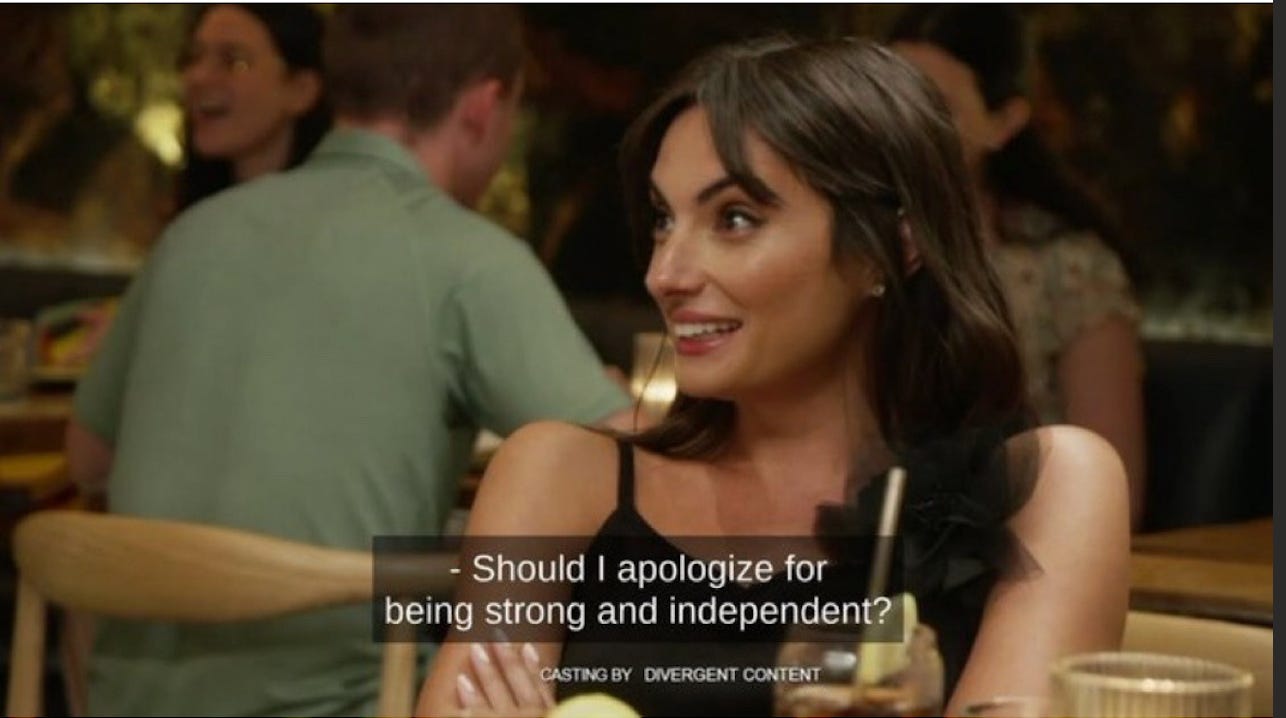
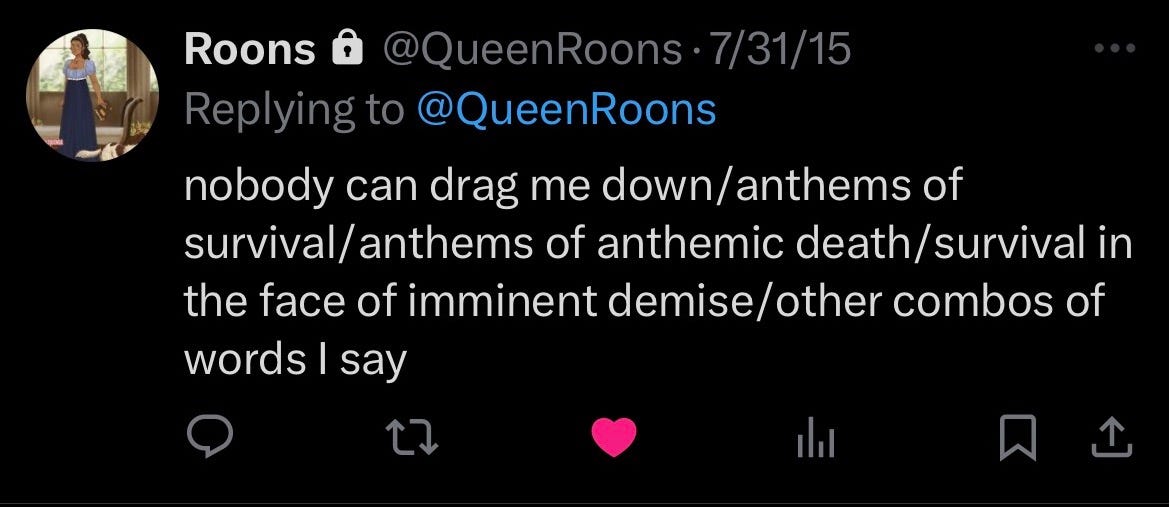
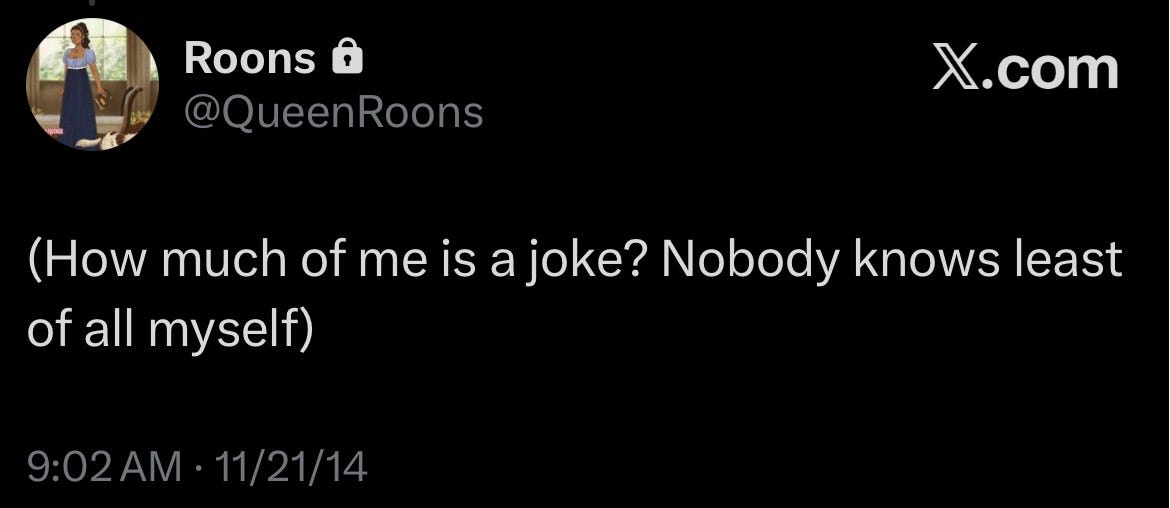
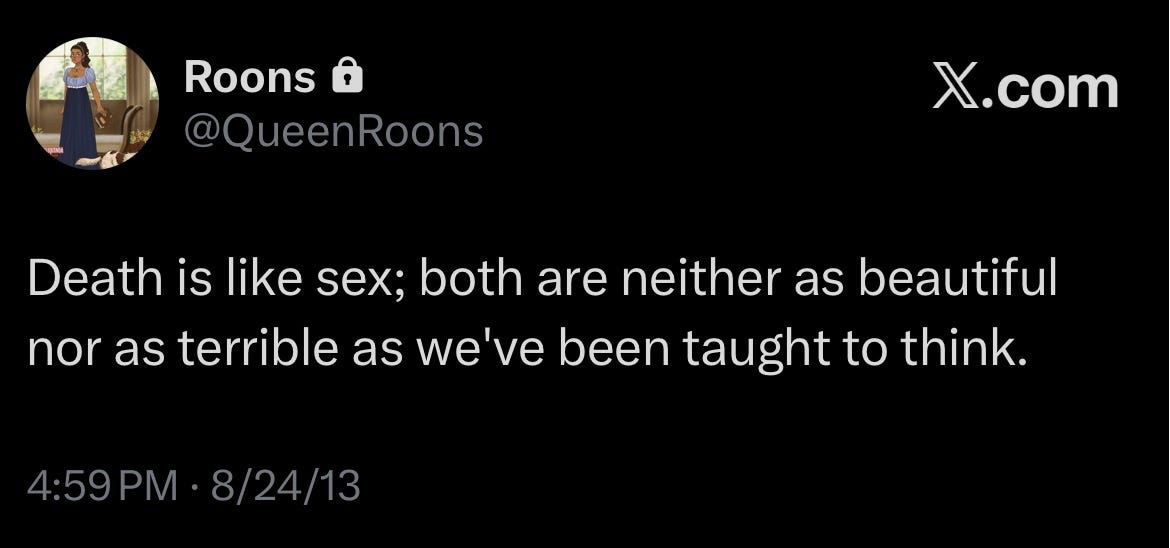
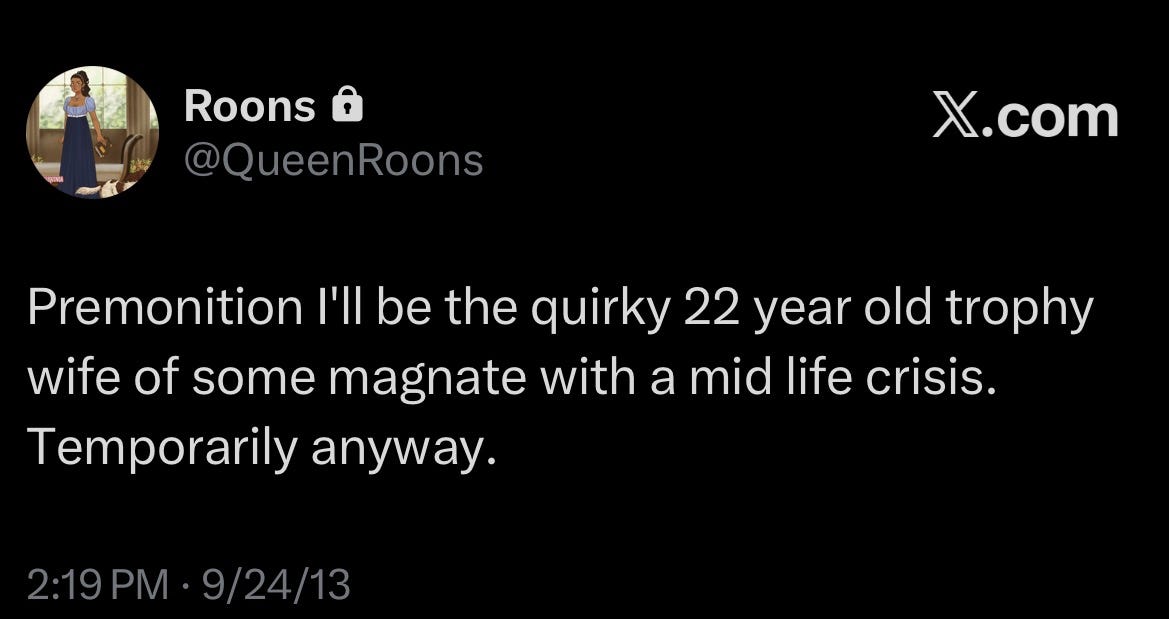
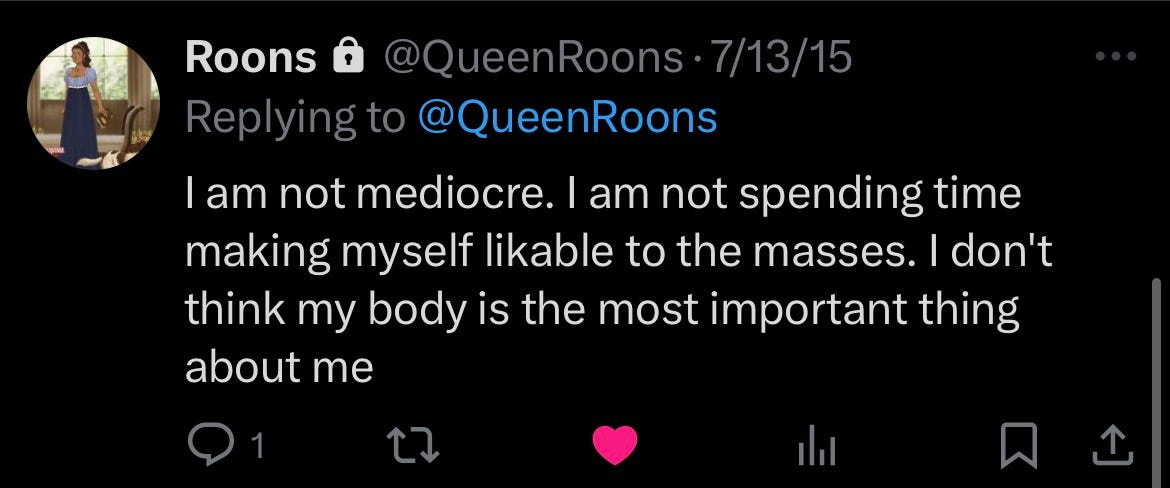
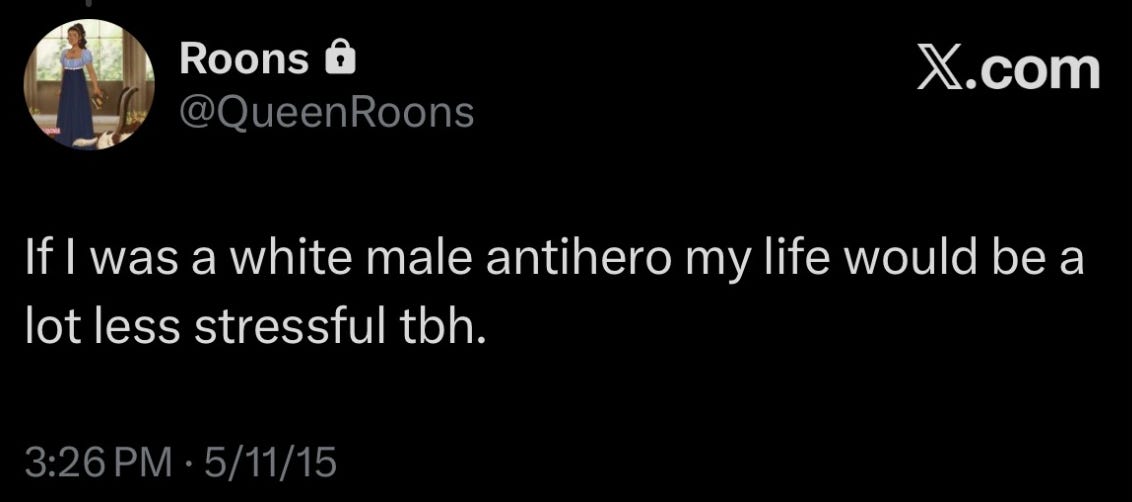
You ate this
Late to this—fantastic piece, and thank you for sharing my essay in this!